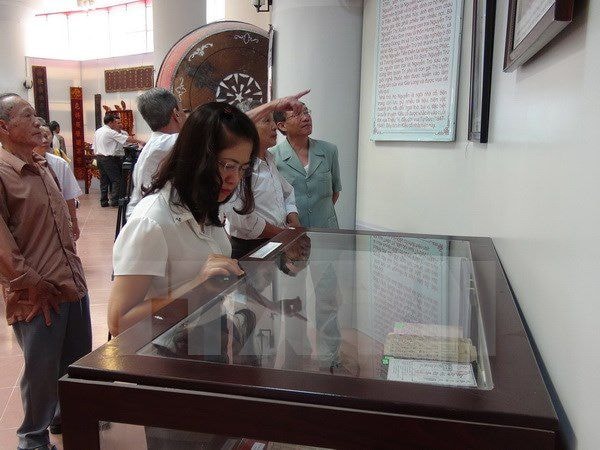The Tale of Kieu - A journey across national borders to enter the world poetry scene
Along with the country's increasingly deep international exchange and integration activities, the masterpiece "Truyen Kieu" has crossed national borders to step into the world poetry scene.
 |
| Delegates visit the exhibition of Nguyen Du family relics at Bac Ninh Provincial Museum. (Photo: VNA) |
Through translations and in-depth research, this posthumous work bearing the "soul" of the nation by the Great Poet Nguyen Du has spread and captivated friends across all continents.
In fact, as early as the end of the 19th century, in 1884-1885, "The Tale of Kieu" was translated into French by Abel des Michel.
In terms of text, this work has so far been translated into most of the most popular languages and has reached a wide audience of readers in all major cultures around the world.
Many generations of Vietnamese scholars, researchers and poets have worked hard to study and understand "The Tale of Kieu" and find ways to overcome the Vietnamese language barrier, which is considered "ever-changing and extremely difficult", to convey the poem with "Eastern Asian spirit and humanistic values of the region" into a new language.
According to preliminary statistics, there have been nearly 40 translations of The Tale of Kieu into more than 20 different languages such as French, English, Japanese, Chinese, Russian, Korean, Hungarian, Polish, Czech, Finnish, Arab, German, Bulgarian, Romanian, Spanish, Mongolian, Lao, Thai...
Many research works on the ideological content and artistic poetics of "The Tale of Kieu" have also been published.
In the US, France and Russia - countries that have had special connections with Vietnam in history, "The Tale of Kieu" has been translated and researched quite a lot. In particular, in French alone, The Tale of Kieu has up to 13 translations.
The French's respect for "The Tale of Kieu" is demonstrated by the fact that this work and its author Nguyen Du were included in the famous dictionary "Works of all times and countries" of the Society for Compiling Dictionaries and Encyclopedias, published in Paris in 1953 (Dictionnaire des oeuvres de tous les temps et de tous les pays - Société d'édition de dictionnaires et encyclopédies, Paris 1953).
Notably, besides the translations of "The Tale of Kieu" by Vietnamese scholars or overseas Vietnamese, some translations of "The Tale of Kieu" were also translated into French by French poets.
At the beginning of the 20th century, when translating, poet Rene Crayssac was moved to write a poem called "Kim and Kieu."
This French researcher also assessed that "Nguyen Du's 'Truyen Kieu' is a masterpiece that can be compared with masterpieces of any country and era."
In the US, the translation and research of "The Tale of Kieu" took place before former President Bill Clinton (November 2000) and Vice President Joe Biden (July 2015) "quoted" Kieu.
In 1973, Vietnamese-American professor Huynh Sang Thong, a lecturer at Yale University, translated "The Tale of Kieu" into English.
There are also three other translations by Le Xuan Thuy, Le Cao Phan and Michael Counsell. At the University of California, Professor Mariam has also done many in-depth and specialized research articles on "The Tale of Kieu."
In Russia, "The Tale of Kieu" was introduced and researched quite elaborately by a series of names such as N.Niculin, Tcachiov, Steinberg...
In Germany, during the Vietnam War, Irene and Franz Faber spent more than 7 years translating "The Tale of Kieu" from French and completed it in 1963.
In Japan, during World War II, "The Tale of Kieu" was translated from French by translator Komatsu Kiyoshi, who compared the work to Genji Monogatari - a masterpiece of Japanese literature, commenting: "This is a long lyrical poem containing a lot of the spirit and culture of the Annamese people."
In Korea, "The Tale of Kieu" is so highly regarded by readers here that they call their work "The Tale of Xuan Huong" (also about a talented and beautiful woman who, despite falling to a low social status, still maintains her personality) with the phrase "The Tale of Kieu of Korea."
In China, many researchers have called "The Tale of Kieu" with the phrase "Vietnam's number one literary masterpiece" and called Nguyen Du "Vietnam's outstanding poet."
"The Tale of Kieu" is also especially closely associated with the spiritual life of Vietnamese people living abroad.
According to Dr. Bountheng Souksavatd of the Lao National Institute of Social Sciences, "The Tale of Kieu" still exists and shines in every Vietnamese person in Laos, whether old or young.
And what is more important for Vietnamese people in Laos is that there are few authors and works that are so ingrained in their blood and have such lasting vitality...
Nguyen Du is the first Vietnamese poet to enter the history of human culture. To this day, "The Tale of Kieu" is also the most read and shared Vietnamese work in the world.
Never before have there been as many people who love and voluntarily study Nguyen Du and "The Tale of Kieu" as there are today. This proves that Nguyen Du has had a new life outside the country.
In 1965, Nguyen Du officially went out to the world when the World Peace Council proposed to celebrate the 200th anniversary of his birth along with 8 other world cultural celebrities, including Dante (Italy) and Lomonosov (Russia).
Taking place this year in accordance with the resolution of the UNESCO General Assembly, activities on a national and international scale to celebrate the 250th anniversary of Nguyen Du's birth are an opportunity to affirm his name and bring the immortal values of "The Tale of Kieu" and Vietnamese national culture to shine and reach further.
According to Vietnam+






